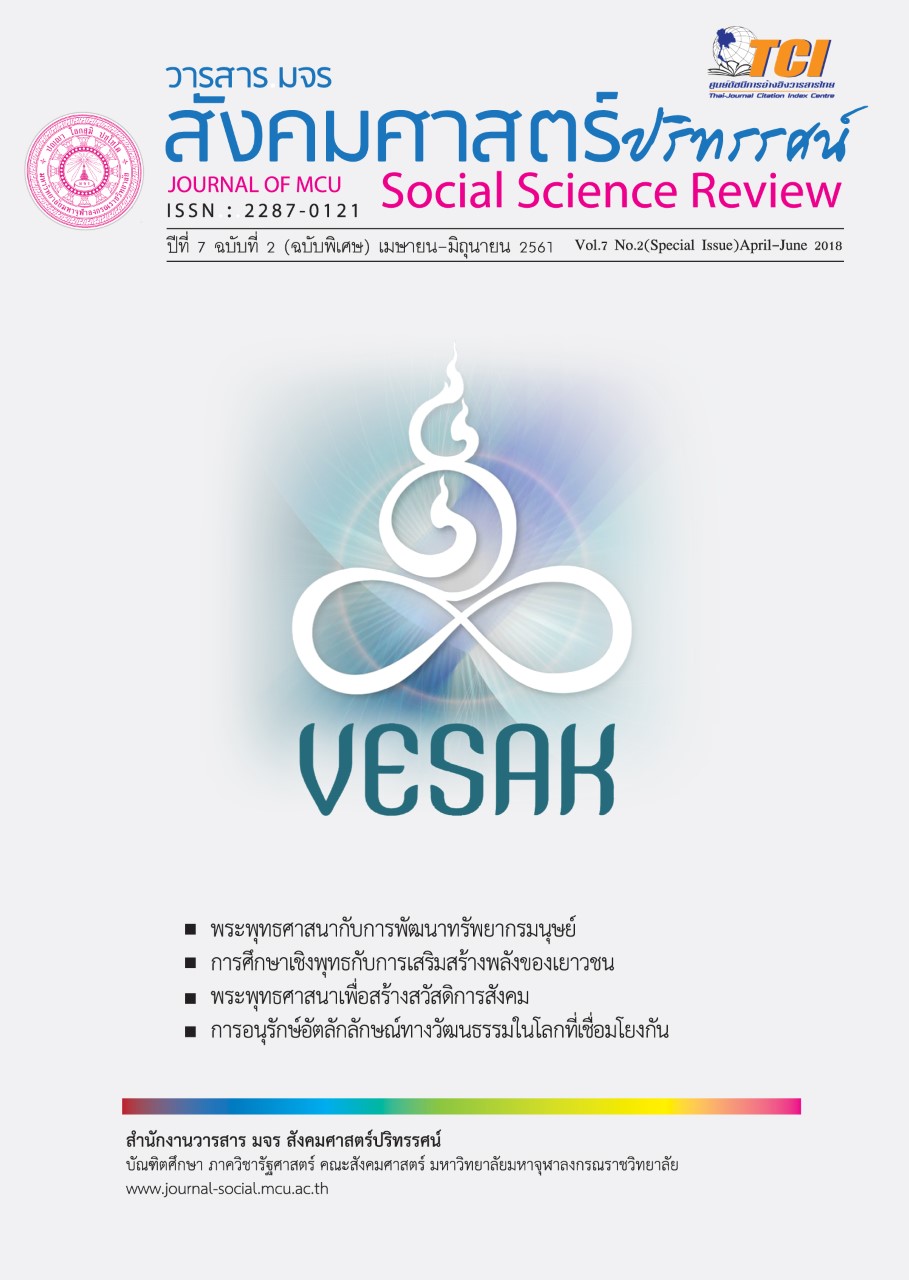TIME MANAGEMENT WITH BUDDHIST INTEGRATION
คำสำคัญ:
Time Management, Buddhist Time Management, Buddhist Integrationบทคัดย่อ
The objectives of this research were: 1) to study the General Time Management (GTM) theory, 2) to study the Time Management in Buddhism (BTM). 3) to integrate the General Time Management theory with Time Management in Buddhism, and 4) to propose a guideline and a new body of knowledge on "Integrated Buddhist Time Management Model". The data of this qualitative research were collected from the Tipitaka, Commentaries, Buddhist literary works, related documents, in-depth interviews with 11 key - informants, and focus group discussions with 32 experts. The data were analyzed, synthesized and classified in category.
The results of the thesis were found as follows:
Time management is spending the time in accordance with activity, work and life with the plan focusing on the outcome of the task relating to happiness and achievement as the goal. Time management consists of planning, organizing, priority, proper work distributing, and learning the nature of oneself in order to manage time more effectively. Time management in this way can cause stress and suffering in life easily.
Time management in Buddhism emphasizes the duration of time. It is moving forward without limitation and has distinction in state of existence and plane of existence, and conditions of individual desires. Time is a frame or scope set up for a particular activity or purpose. Time is not the factor used to determine the outcome of dhamma. Time management in Buddhism is both art and science in doing activities in living a life. Spending time in every step of life-long activities is the perfect time consuming, not dependent on any auspicious occasion and horoscope. Time management in Buddhism is focused on advantage, righteousness and mindfulness as the goal, not recall to the past, worry to the future, but concentrate to do best at the present.
The time management with Buddhist integration is a holistic activity management including life and awareness of reason, principle, method and system of oneself and the others as dependent factors. Knowledge as the art is focused for an achievement of advantage and life development of individual and society in an appropriate time by not wasting the time in activity process. The time management in Buddhism is based on the righteousness, justice, and approvable goodness. The time management in Buddhism is the effective management of man and work in an appropriate time with awareness and knowledge based on utilization and truth.
The body of knowledge on time management in Buddhism is the awareness of present and mindfulness in time spending based on knowledge in utilization and truth. The knowledge obtained from the study can be concluded in “MKUT Model”.
เอกสารอ้างอิง
Lisa J. Downs. Time Management Training. Victor Graphics, Inc. Baltimore, Maryland.
Mahachulalongkornrajavidyalaya University. (1996). The Tipitaka in Thai Version belonging to Mhachulalongkornrajavidyalaya University.Bangkok: Mahachulalongkornrajavidyalaya University.
Michael Roberts. Time Management. Bangkok. Bangkok: Thanapad Publishing Co., Ltd. 2006.
Phra Brahmagunabhorn (P. A. Payutto). (2009). Chronology of Buddhism in World Civilization, Bangkok: Phlithamm Publishing Co., Ltd.
Somdet Phra Nyanasamvara Somdet Phra Sangharaj (2017) Life is Short and Time is Swift, Bangkok: Mahamakuta Rajavidyalaya Foundation.
ดาวน์โหลด
รูปแบบการอ้างอิง
ฉบับ
ประเภทบทความ
สัญญาอนุญาต
ลิขสิทธิ์ (c) 2020 วารสาร มจร สังคมศาสตร์ปริทรรศน์

อนุญาตภายใต้เงื่อนไข Creative Commons Attribution-NonCommercial-NoDerivatives 4.0 International License.
เพื่อให้เป็นไปตามกฎหมายลิขสิทธิ์ ผู้นิพนธ์ทุกท่านต้องลงลายมือชื่อในแบบฟอร์มใบมอบลิขสิทธิ์บทความให้แก่วารสารฯ พร้อมกับบทความต้นฉบับที่ได้แก้ไขครั้งสุดท้าย นอกจากนี้ ผู้นิพนธ์ทุกท่านต้องยืนยันว่าบทความต้นฉบับที่ส่งมาตีพิมพ์นั้น ได้ส่งมาตีพิมพ์เฉพาะในวารสาร มจร สังคมศาสตร์ปริทรรศน์ เพียงแห่งเดียวเท่านั้น หากมีการใช้ภาพหรือตารางหรือเนื้อหาอื่นๆ ของผู้นิพนธ์อื่นที่ปรากฏในสิ่งตีพิมพ์อื่นมาแล้ว ผู้นิพนธ์ต้องขออนุญาตเจ้าของลิขสิทธิ์ก่อน พร้อมทั้งแสดงหนังสือที่ได้รับการยินยอมต่อบรรณาธิการ ก่อนที่บทความจะได้รับการตีพิมพ์ หากไม่เป็นไปตามข้อกำหนดเบื้องต้น ทางวารสารจะถอดบทความของท่านออกโดยไม่มีข้อยกเว้นใดๆ ทั้งสิ้น





